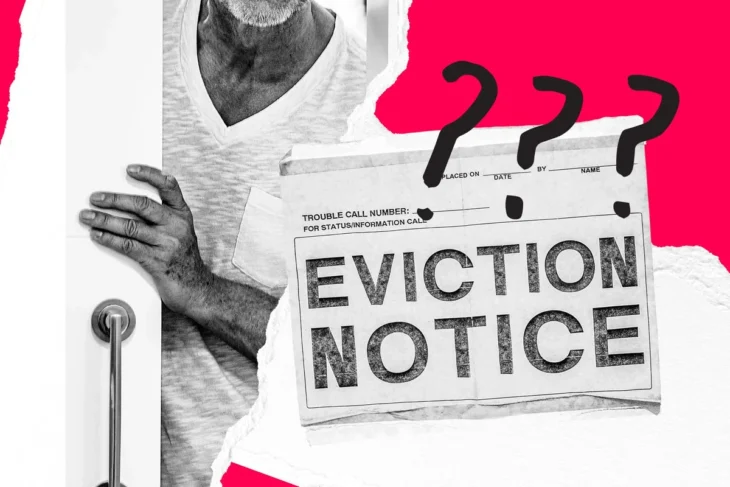It’s a general belief that the landlords can’t evict the tenants in wintertime. However, the Residential Tenancies Act, 2006, Chapter 17 (Ontario) doesn’t state anything specific about the eviction of tenants in winter.
Still, it does lay down laws for various residential tenancy issues for preventing eviction in winter. Besides, it is also to be noted that Residential Tenancies Act does feature section 83, whereby an adjudicator uses his discretion to make a fair decision in eviction cases.
If the tenant disputes the residential eviction, a valid legal reason is to be provided by the landlord to prove the righteousness of the eviction. Generally, tenants are evicted due to their behaviour or if the landlord requires the unit for self-use. Be sure to visit Surex to learn about tenant eviction and tenant insurance in Canada in detail.

Source: bloomberg.com
Contents
Tenant eviction due to their behaviour
The Residential Tenancies Act states that a landlord has the right to evict a tenant at any given time or date if the tenant, their guest, or any other person living in the rental unit does anything which isn’t acceptable such as:
- Failing to pay the rent
- Continuous delay in paying the rent
- Disturbing or troubling the neighbours
- Doing actions leading to property damage
- Overcrowding
- Doing things of illegal nature on the property
Additionally, tenants are also responsible for the actions of their children and guests, hence they can be evicted as a consequence of their actions. However, a tenant can’t be evicted for keeping a roommate. Still, it can be a potential reason for eviction if the roommate causes trouble for other tenants, neighbours, or landlords, irrespective of the season.
Major reasons for a tenant’s eviction
Besides the above, several other reasons can create circumstances for the tenant’s eviction. They are categorized as “no-fault” evictions. Read on to learn about these eviction applications and how can a landlord evict a tenant:

Source: independent.co.uk
Personal use claims application
The tenant may be evicted under the circumstances where the landlord needs the rental unit for personal use. The landlord may require the unit for the following purposes:
- Self-use
- For an immediate family member
- For an individual, the landlord may hire for care services either for himself or for an immediate family member. In this scenario, the person receiving the care services will live in the same complex or building.
Tenants living in a small rented house, apartment building, or a part of a large house that any management company doesn’t own are at a high risk of being evicted in case the landlord or any of the immediate family member/s of the landlord wants to move to the place.
Eviction at any time of the year is also possible for the tenants who don’t have a lease. In such a case, a 60 days notice is given by the landlord or any family member.
If the tenants have a lease and the landlord wants the premises for self-use, they can’t evict the tenants before the expiry of the lease or unless the Tenant Board issues an eviction notice.
To remove the tenant, some landlords also practice illegal eviction tactics such as changing the locks, threatening or harnessing the tenant, shutting off utilities, or removing the tenant’s belongings from the rental place.
The Rental Fairness Act, 2017, passed on May 18, 2017, amended the Residential Tenancies Act. The provisions are tightened under the renewed Act, which permits the landlord to evict a tenant if the landlord or their caregiver/family member needs the unit for self-use.
But before the eviction, the landlord should prove their intention of moving into the unit for self-use for residential purposes for at least a year.
The proof of “self-use” may include:
- Document of a contract with a moving company
- Notice for ending the tenancy by the tenant to the landlord
- Notice is given to the landlord by a tenant for change of address
As per the rule of law, the landlord is liable for compensating the tenant with one month’s rent. Alternatively, they may provide another residential rental unit to the tenant if the eviction notice is invalid, according to the tenant. Also, the landlord should file an application with the Tenant Board and Landlord for enforcing eviction.
Further amendments in the Residential Tenancy Act have been added for preventing “unlawful” evictions. The Board considers eviction after determining that the landlord is giving notice of eviction in good faith.

Source: abc11.com
Eviction application for renovation
“No-fault” eviction or “renovations” eviction is considered when the landlord evicts a tenant for permit conversions, renovations, or repairs of the building. The unit needs to be empty for these purposes. As compensation, the landlord should give one month’s rent to the tenant for eviction.
Can a landlord evict a tenant in winter or not?
Can a landlord evict a tenant? Yes, but can he do so in winter? The tenant may refuse to leave the rental unit in winter even after receiving an eviction notice sent by the landlord. In cases like this, the landlord heads to the Tenant and Landlord Board of the province for ending the tenancy.
After the tenant applies, the Board holds a hearing and decides whether or not the eviction is justified. Both the tenant and the landlord are required to attend the Board’s hearing to explain their side of the matter to the board members.
If the Board grants an Eviction Order, the tenant should give sufficient time for leaving the unit. If the tenant doesn’t move out even after receiving the eviction order, the landlord may file an eviction request with the Court Enforcement Office.
The eviction order is then enforced by a sheriff so that the tenants leave the residential rental unit. If a tenant is locked out of the rental place by the landlord without the presence of a sheriff, then the tenant has the right of contacting the police for re-entering into the unit.
Landlords don’t have the right to remove the tenant from the rental unit. Only the sheriff has the right to evict the tenant physically. And as mentioned earlier, an application needs to be filed with the Tenant and Landlord Board for the proper execution of the eviction process.

Source: slate.com
Endnote
It is always important to know about the legalities associated with tenant evictions so that the landlord doesn’t take undue advantage. This becomes more important in the case of winter evictions. You can always consult a professional who can help you sort out the legal hindrances.
